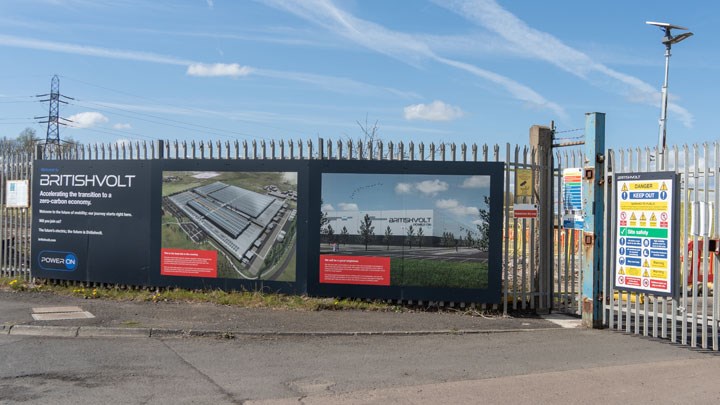Companies eye Britishvolt site in the wake of company collapse

UK battery firm Britishvolt has received interest from more than a dozen companies looking to buy its Northumberland, UK factory site, after last minute talks to save the company failed. The company was forced into administration earlier this week.
This, coupled with other recent industry setbacks, has prompted government to launch an inquiry into UK EV manufacturing.
The site in Blyth is a former power station, and the firm’s largest asset. It has access to a deep water port, clean energy and good transport links, making it an attractive location for businesses such as Tata Motors, owner of Jaguar Land Rover, who according to the Financial Times have expressed interest in the site.
Ministers had hailed the plans to build a “gigafactory” in the northeast as a "levelling up" opportunity that would boost the region's economy and support an industry which is falling behind its European counterparts in developing electric car batteries.
The UK government pledged £100m (US$123m) to support the project, but Britishvolt’s request to access £30m of the pot after a series of delays caused the firm to narrowly avoid collapse at the end of last year, was refused. Ministers cited concerns that the criteria needed to release the monies — including private sector investment — had not been met.
An emergency lifeline extended by Glencore, one of its investors, staved off closure for a few more weeks, but it wasn’t enough. Britishvolt then fell into administration on Tuesday after a last-ditch attempt to raise more funds was blocked by its creditors.
Any firm considering the purchase of the site and wanting access to the funds set aside for the project by the government, must be planning to build a battery manufacturing plant and have at least £150m of working capital, FT reports.
Hanging in the balance while decisions are being made are Britishvolt’s employees. The majority of the company’s 232 staff were made redundant on Tuesday with immediate effect, while about 26 workers remain.
Financial strategists EY-Parthenon, who have been appointed joint administrators of the company, described the collapse as "disappointing", and said all impacted staff were being offered support.
Speaking to the BBC, Jim Holder, editorial director at What Car?, warned that the situation was "very bad news for the whole industry", as at least five such facilities are needed by the end of the decade in order for the UK to remain a competitive country to build electric cars in. "The only positive will come if it spurs government into action to secure a partnership between itself, the industry, and battery manufacturers that can succeed into the long-term," Holder said.
Jonathan Reynolds, shadow business secretary, told the House of Commons on Wednesday that the collapse of Britishvolt into administration “is in no uncertain terms a disaster for the UK car industry,” adding that it was “the symptom of a much wider failure”.
His Labour colleague Darren Jones, Labour chairman of the Commons Business, Energy and Industrial Strategy (BEIS) Committee echoed the statement saying that the government needed to do more to support the UK's electric vehicle industry. "There is a case to be made here in the UK for ministers and the government to be much more closely involved in delivering a successful battery manufacturing factory,” Jones said.
EV manufacturing inquiry
The collapse of Britishvolt has now prompted an inquiry by the BEIS Committee into the supply of batteries for EV manufacturing in the UK and the feasibility of British production. BEIS noted that this inquiry comes after BMW halted production of the electric Mini at its Oxford site in October, leaving the Chinese-backed Envision site in Sunderland as Britain’s only manufacturer of vehicle batteries.
Recent Editions
Catch up on the latest news, views and jobs from The Chemical Engineer. Below are the four latest issues. View a wider selection of the archive from within the Magazine section of this site.




